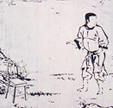What Didn't We Know and When Didn't We Know It?
This year
marks the 50th anniversary of the assassination of President
Kennedy, so we will be treated once again to stories about his death, about
enduring puzzles of the case, and so on.
In 1963, the authorities decided that a 24-year-old communist did it
with a $12 rifle — a conclusion that was not widely accepted. Speculation turned to the involvement of
Fidel Castro or, more likely, gangsters, as the killing slowly gained an
underserved reputation for impenetrability.
Now, a haunting irony supposedly looms over this signal event — that
after all the probes and investigations, we might never know who did it.
It is a
testament to the power of secrecy that such ridiculous notions arose and persist,
because the murder was not a particularly difficult crime to solve. All that was missing was a good-faith
investigation. For example:
Whatever
you might think about alleged assassin Lee Oswald, I’m sure you’ll agree that he
was younger once. He was a teenager
once. He had a few part-time jobs in
1955 and 1956 before he joined the Marines, and they are listed in the Warren Report. He was a stock boy at Dolly Shoe Company. He worked at Pfisterer Dental Lab and Gerard
F. Tujague, Inc., a shipping company. The
F.B.I. found his W2s among his possessions — and buried them. Why?
Decades
passed. Today, thanks to the
declassification process created by Congress in 1992, the reason for secrecy is
clear: the W2s bear tax identification numbers issued by the I.R.S. in January
of 1964. In fact, rather a lot of
“facts” about Oswald have turned out to be similarly crafted fictions.
The “organized crime” theory of the
shooting has an air of plausibility to it because we know how bad those people
can be. But, like the other “it wasn’t
us” stories; it can’t actually explain
anything.
Did
gangsters forge those W2s? Did hired
muscle arrange an illegal, secret, military autopsy to misrepresent, alter, and
destroy medical evidence? Did Carlos
Marcello convince the F.B.I. to run neutron activation tests of material in the
case and then conceal the findings? Did the
families lean on Lyndon Johnson to sign an executive order classifying evidence
for 75 years? Did powerful criminal
elements persuade the House Select Committee on Assassinations to scoop up further
traces and hide them for half a century?
By the way,
the H.S.C.A. also investigated the murder of Reverend Martin Luther King, Jr.;
and we only have to wait another 26 years to find out what they uncovered.
Labels: Federal Bureau of Investigation, John Kennedy, organized crime


0 Comments:
Post a Comment
<< Home